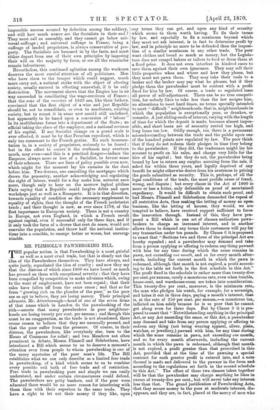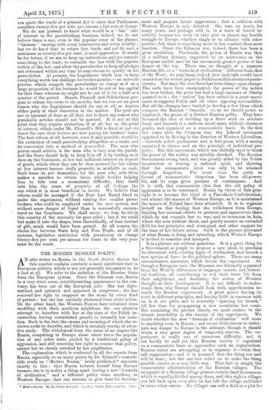MR. PLIMSOLL'S PAWNBROKING BILL. T HE popular notion is that Pawnbroking
is a most gainful as well as a most cruel trade, but that is clearly not the idea of the Pawnbrokers themselves. They have always, and quite justly, repudiated the idea of cruelty ; and now they say that the distress of which since 1866 we have heard so much has pressed on them with exceptional severity ; that they have been compelled by competition to make advances which, owing to the want of employment, have not been repaid ; that their sales have fallen off from the same cause ; and that so far from "growing rich on the plunder of the poor," as the poor are so apt to believe, they are losing money. Their principal advocate, Mr. Attenborough—head of one of the seven firms of that name which in London do the pawnbroking of the rich—asserts that many pawnbrokers in poor neighbour- hoods are losing twenty per cent. per annum ; and though this must be an exaggeration, as the trade is not abandoned, there seems reason to believe that they are unusually pressed, and that the poor suffer from the pressure. Of course, in their distress, the pawnbrokers, like everybody else, turn to the House of Commons for relief ; and two Members not often prominent in debate, Messrs. Plimsoll and Sidebotham, have introduced a Bill which seems to us to deserve a moment's attention even from people to whom pawnbroking is one of the many mysteries of the poor man's life. The Bill establishes what we can only describe as a limited free trade in pawnbroking, of a kind which seems to us to combine every possible evil both of free trade and of restriction. Free trade in pawnbroking pure and simple we can easily understand, and under certain circumstances could defend. The pawnbrokers are petty bankers, and if the poor were educated there would be no more reason for interfering with them than with their superiors in the same trade. They have a right to let out their money if they like, upon any terms they can get, and upon any kind of security which seems to them worth having. To fix their terms- by law, and especially to fix a maximum beyond whichi they must not ask interest, is in fact to determine profit by law, and in principle no more to be defended than the imposi- tion of a similar maximum in any other trade. The poor want clothes and bread as much as money, but the Legisla- ture does not compel bakers or tailors to feed or dress them at a fixed price. It does not even interfere in kindred cases to save them against their own ignorance. They may sell their little properties when and. where and how they please, bat they must not pawn them. They may take their tools to a. broker and the broker may pay what he pleases, but if they pledge them the pawnbroker must be content with a profit fixed for him by law. Of course, a trade so regulated loses- all power of self-adjustment. There can be no true competi- tion, for nobody likes to take less than the law assigns him, no alterations to meet hard times, no terms specially intended. to meet "difficult "neighbourhoods, that is, neighbourhoods in which the population is exceptionally poor, or drunken, or nomadic. A just sliding-scale of interest, varying with the length of time for which the deposit is made, becomes almost impos- sible, and short loans are of necessity rented too high, and, long loans too low. Oddly enough, too, there is a permanent misunderstanding between the trade and the public upon one- of the hundred points now regulated by law. The poor think_ that if they do not redeem their pledges in time they belong to the pawnbroker. If they did, the tradesman might lay his accountto profit on his sales, and charge very little for the hire of his capital ; but they do not, the .pawnbroker being bound by law to return any surplus accruing from the sale, if asked for within three years, and legally deprived of any benefit he might otherwise derive from his acuteness in pricing- the goods submitted as security. This is, perhaps, of all the- legal conditions of the trade, the most prolific cause of fraud, wrong, and dispute ; but every clause in the Act of 1800 is- more or less a fetter, only defensible on proof of ascertained expediency. It would be difficult to obtain such proof, and. had Messrs. Plimsoll and Sidebotham demanded the repeal of all restrictive Acts, thus making the letting of money an opens business, like the letting of houses, they would, we are- tempted to believe, have received support sufficient to force the innovation through. Instead of this, they have pro- posed a Bill which in one set of clauses authorizes pawn- brokers to charge an increased interest, and in another- allows them to demand any terms their customers will pay for any transaction under ten pounds. By Clause 6 it is proposed. to enact that "Sections two and three of the principal Act are- hereby repealed ; and a pawnbroker may demand and take- from a person applying or offering to redeem any thing pawne& with him for any time during which the same remains in. pawn, not exceeding one nionth, and so for every month after- wards, including the current month in which the pawn is. redeemed, although that month is not expired, a profit accord- ing to the table set forth in the first schedule to this Act." The profit fixed in the schedule is rather more than twenty-five- per cent. per annum, surely a monstrous rate, even when trouble, house-rent, and warehouse-room are taken into consideration. This twenty-five per cent., moreover, is the minimum rate,. the man who pledges his watch, for example, for a sovereign, and takes it out in three days, paying a month's interest, that is, at the rate of 250 per cent. per annum,—a monstrous tax,. infficted on him. solely bemuse he is so poor that he cannot. get along even for three days. But by Clause 9 it is pro- posed to enact that "Notwithstanding anything in the principal Act, or any Act amending the same, or this Act, a pawnbroker- may demand and take from any person applying or offering to redeem any thing (not being wearing apparel, silver, plate,. watches, or jewellery,) pawned with him, for any time during: which the same remains in pawn, not exceeding one month, and so for every month afterwards, including the current. month in which the pawn is redeemed, although that month. is not expired, a profit greater than that prescribed in this. Act, provided that at the time of the pawning a special contract for such greater profit is entered into, and a note. thereof is made and delivered to the pawnor in the form and according to the regulations set forth in the second schedule to this Act." The effect of these two clauses taken together will be that the pawnbroker may charge anything he likes in excess of twenty-five per cent., but will never take any interest, less than that. The grand justification of Pawnbroking Acts, that they secure money to the poor at moderate interest, dis- appears, and they are, in fact, placed at the mercy of men who can quote the words of a printed Act to show that Parliament considers twenty-five per cent. per annum a fair rate of charge.
We do not pretend to know what would be a " fair " rate of interest in the pawnbroking business, indeed, we do not believe there is any, even in the popular sense of the phrase, " fairness " varying with every transaction and every locality ; but we do know that to refuse free trade, and yet fix such a minimum as twenty-five per cent., is most oppressive. It would be far better, if we are to keep up restrictions, and yet concede something to the trade, to reconcile the law with the popular notion of the law, and allow the pawnbroker to keep all pledges not redeemed within any time he may choose to specify on his pawn-ticket, At present, the Legislature binds him to keep everything worth ten shillings for twelve months,—an imbecile proviso, which compels the pawnbroker to charge as if on a large proportion of his business he would be out of his capital for that time, whereas he might not be out of it for a half or a quarter of the period. Messrs. Plimsoll and Sidebothatu pro- pose to reduce the term to six months, but we can see no good reason why the Legislature should fix any at all, or deprive either party of their discretion in the matter. The poor are not so ignorant of time as all that, nor is there any reason why parishable articles should not be pawned. It is not at this point that they require protection, if at all, but on the point of interest, which under Mr. Plimsoll's Bill is fixed at just six times the rate their betters are now paying for bankers' loans. The best reform of all, however, were it only possible, would be the extinction of small pawnbroking altogether as a trade, and its conversion into a method of poor-relief. The man who pawns small articles is the man who is very near the parish, and the State should help to keep him off it by lending as it does on the Continent, at low but sufficient interest on deposit of goods, which when they can be thus pawned for fair values at low interest become really property, as available as cash. Such loans do not demoralize, for the man who asks them makes a sacrifice to obtain them, while besides helping him to tide over a momentary difficulty, they instil into him the sense of property, of all feelings the one which it is most beneficial to excite. We believe that reform could be managed if the Poor Law Board liked to make the experiment, without ruining the smaller pawn- brokers, who could be employed under the new „system, and without more danger of fraud than is successfully encoun- tered on the Continent, We shall never, we fear, be rid in this country of the necessity for poor relief ; but if we could but make it take the shape, even theoretically, of loan instead of gift, much would have been gained. At all events, the choice lies between State help and Free Trade, and of all systems, legislative restriction with permission to charge twenty-five per cent. per annum for loans to the very poor must be the worst.































 Previous page
Previous page